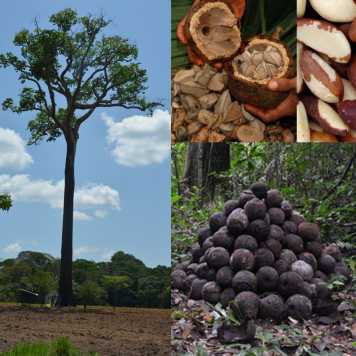The power of tropical tree diversity
New publications from the WFSC member group of Chris Kettle highlight both the peril faced by Brazil nut trees and the power of diversity of tropical tree species to help planetary health.
The nutritious Brazil nut, harvested from giant tropical rainforest trees found in Brazil, Bolivia and Peru, is one of the most economically important non-timber forest products in the world. The WFSC Research Programs project “Developing a sustainable value chain of Brazil nuts for Swiss consumers: an interdisciplinary approach” SUSTAIN aims to examine possibilities to develop a resilient supply chain for certified and sustainable Brazil nuts from Peru.
In a recent article in Plants People Planet, the research team measured the loss of genetic diversity and of inbreeding in samples of Brazil nut trees in the Peruvian Amazon region of Madre de Dios. What they found was that genetic resources are being negatively affected by forest degradation, despite Brazil nut trees being protected by conservation regulation.
Results showed that [Brazil nut seedlings had consistently lower genetic diversity and higher inbreeding than adults, significantly associated with the degree of forest degradation of their origin.] These measured effects have consequences on the reproductive success of these mighty trees.
The authors comment: Understanding the effects of anthropogenic habitat disturbance as on the reproductive patterns and genetic resources of Brazil nut populations is essential to be able to maintain sustainable production levels.
The importance of the benefits to tree-sourced food like Brazil nuts to nutrition, ecosystems, and livelihoods is further explored in a new comment article in People and Nature. Lead author Merel Jansen and the research team comment that: tropical tree diversity offers the potential for sustainable production of many foods, providing livelihood benefits and multiple ecosystem services including improved human nutrition.
The authors also [discuss several risks and limitations that must be taken into account when scaling‐up tropical tree‐based food production, including the importance of production system diversity and risks associated with supply to the global markets.]
Read the entire article in "Genetic threats to the Forest Giants of the Amazon: Habitat degradation effects on the socio‐economically important Brazil nut tree (Bertholletia excelsa)" in Plants People Planet external pageherecall_made
And read the comment article "Food for thought: The underutilized potential of tropical tree‐sourced foods for 21st century sustainable food systems" in People and Nature external pageherecall_made

The papers are outputs of the WFSC Research Program project " Developing a sustainable value chain of Brazil nuts for Swiss consumers: an interdisciplinary approach” (SUSTAIN). For more information on the project, visit the project page
